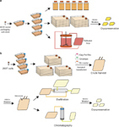Atara Biotherapeutics, Inc. (Nasdaq:ATRA) today announced that its collaborative partner, Memorial Sloan Kettering Cancer Center (MSK) has received breakthrough therapy designation from the U.S. Food and Drug Administration (FDA) for Atara's optioned cytotoxic T lymphocytes activated against Epstein-Barr Virus (EBV-CTL) in the treatment of patients with rituximab-refractory, EBV-associated lymphoproliferative disease (EBV-LPD), a type of malignancy occurring after allogeneic hematopoietic cell transplantation (HCT). Allogeneic HCT is also commonly called a bone marrow transplant. -
The T-cell collaboration with MSK consists of three types of CTLs, each focusing on targets involved in cancers and serious infections. Using these cells, the power of the immune system can be employed to attack cancer cells and cells infected with certain viruses. T-cells may be effective even after failure of multiple other agents, and may avoid the toxicities of current treatments in patients with cancers and serious viral infections. CMV-CTLs and EBV-CTLs are currently in Phase 2 clinical trials and WT1-CTLs are currently in Phase 1 clinical studies.
The EBV-, CMV- and WT1-targeted T-cell product candidates share a common technology in which third-party donor-derived white blood cells are collected via leukapheresis (white blood cell collection) and are then enriched for T-cells. The T-cells are exposed to certain antigens (proteins that are recognized and attacked by the immune system), and the resulting activated T-cells are characterized and stored for future therapeutic use in a partially human leukocyte antigen, or HLA, matched patient. MSK has developed banks of these off-the-shelf, target-specific T-cell product candidates suitable for investigational use in patients with a wide range of HLA types.
Via Krishan Maggon



 Your new post is loading...
Your new post is loading...










The Epstein-Barr virus (EBV) is a ubiquitous virus that causes infectious mononucleosis in people with normal immune function; however, in immunocompromised patients such as those undergoing hematopoietic cell or solid organ transplants, it can cause lymphoma and other cancers. EBV-CTLs are a potential third-party, donor-derived, off-the-shelf T-cell product candidate designed to target and destroy EBV-infected lymphoma cells.
EBV-CTLs are being studied in an ongoing Phase 2 clinical trial to test anti-tumor efficacy and safety in patients with EBV-associated lymphoproliferative disease (EBV-LPD) following allogeneic hematopoietic cell transplant (alloHCT). AlloHCT is a transplant of bone marrow stem cells from one person to another as a means to treat a variety of serious diseases, primarily blood cancers.
In immunocompromised people, EBV can cause lymphomas and other lymphoproliferative disorders, collectively called EBV-LPD. EBV-LPDs are a significant cause of morbidity and mortality following alloHCT. EBV-LPDs may occur in up to 6% of patients following alloHCT. There are limited treatment options, especially in those patients who have failed initial therapy with rituximab. For example, median survival from EBV-LPD diagnosis following relapse from or failure of rituximab therapy was reported by Fox and colleagues in 2014 to be 33 days among 14 patients reported and 16 days among 40 patients reported by Uhlin and coworkers in 2013.